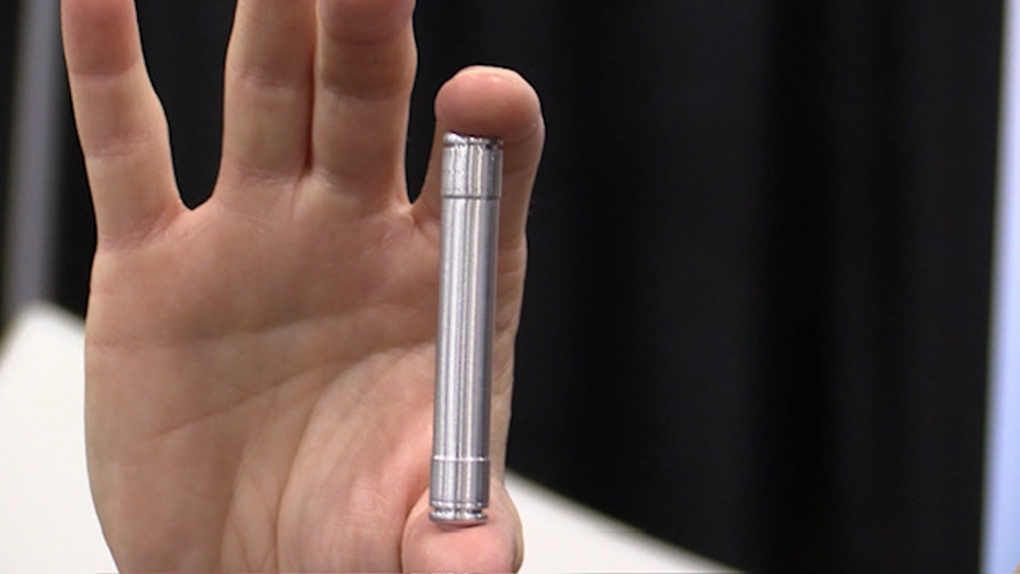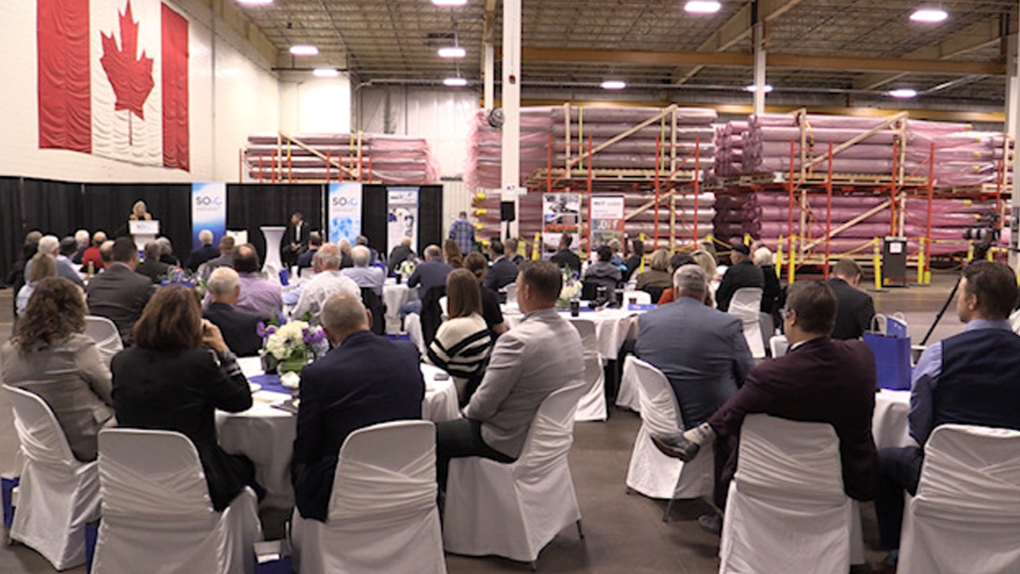Industry investing in nuclear energy spinoff that can detect cancer
It’s hard to believe something so small, the size of your index finger, can be at the centre of a multi-billion dollar industry, that very few people even know exists.
“A lot of people look at nuclear power and they think only of power, energy, electricity, but a lot of people don’t really recognized the other critical aspect of what, particularly, CANDU reactors can do, which is medical isotopes,” said BWXT Executive VP of Projects and Services Scott Gray.
Medical isotopes are at the centre of nuclear medicine.
They are used around the world to detect and treat cancer, along with sterilizing medical equipment. They are a potential by-product that can come from nuclear reactors, which Ontario has plenty.
In fact, per cent of the world’s single-use medical equipment is sterilized by medical isotopes produced at the Bruce Power nuclear plant near Kincardine, Ont.
 An example of a medical isotope produced at Bruce Power’s nuclear facility near Kincardine, Ont., as seen on Oct. 16, 2023. (Scott Miller/CTV News London)
An example of a medical isotope produced at Bruce Power’s nuclear facility near Kincardine, Ont., as seen on Oct. 16, 2023. (Scott Miller/CTV News London)
“Around the world, the demand for these isotopes is increasing. For 50 years, the world has counted on Canada to meet that demand. This is an opportunity for Canada to step up and meet that challenge,” said Bruce Power Executive and Canadian Nuclear Isotope Council Chair James Scongack.
In a facility in Owen Sound that makes parts to harvest those medical isotopes, industry experts and municipal leaders met to kick off the ‘Southwestern Ontario Isotope Coalition.’
It’s an organized effort to help Canada double its isotope production by 2030 and grab a piece of the over $6 billion a year industry that’s expected to grow by 15 per cent for the next decade, and already has a foothold in midwestern Ontario thanks to Bruce Power.
“The opportunity to leverage that and really help people understand the power behind that. It might mean working towards research facilities. It might mean figuring out a workforce potential and how we can train the next generation to be a part of this industry. It’s very exciting times for our region,” said Jessica Linthorne, chief operating officer with Port Elgin’s Nuclear Innovation Institute (NII).
 Industry experts and municipal leaders met in Owen Sound on Oct. 16, 2023, to help launch the Southwestern Ontario Isotope Council. (Scott Miller/CTV News London)
Industry experts and municipal leaders met in Owen Sound on Oct. 16, 2023, to help launch the Southwestern Ontario Isotope Council. (Scott Miller/CTV News London)
Bruce Power has been producing medical isotopes for 35 years, but significantly ramped production starting last year.
Complimentary companies like BWXT, who build isotope delivery and harvesting systems, may not have come to Owen Sound if not for the region’s renewed focus of the burgeoning isotope industry.
“I’ve spent my entire career working in the nuclear industry, building new plants, and the sort. I never got into medical isotopes until I came up here. It’s absolutely amazing what the possibilities are,” said Gray.
“If this region and Canada is not there, there is nobody else that the institutional assets that we have to meet this. And I worry, unless we’re successful, it will mean that patients around the world will not have access to [the cancer treatments] they deserve,” said Scongack.
You can learn more about the Southwestern Ontario Isotope Coalition, founded by the City of Owen Sound and Bruce Power by visiting their website.
CTVNews.ca Top Stories

Landslide closes B.C.'s Sea to Sky Highway; reception centre opened for stranded travellers
A landslide shut down the Sea to Sky Highway in both directions near Lions Bay Saturday morning, and authorities expected the road to remain closed for at least the rest of the day.
Montreal man died of aneurysm after waiting 6 hours in ER
A 39-year-old Montreal man died of an aneurysm after spending six hours in an emergency room before giving up and going home.
Canada Post union negotiator balks at labour minister's calling for a 'time-out'
This week, Labour Minister Steven MacKinnon announced a 'time-out' in the ongoing Canada Post strike. In a way, Canadian Union of Postal Workers (CUPW) negotiator Jim Gallant says he agrees with that phrasing.
'We called a Code Silver': LHSC goes into lockdown after shooting outside emergency department
The emergency department (ED) doors at LHSC Victoria Campus were being repaired Saturday morning after a person fired a gun into the glass.
ABC agrees to give US$15 million to Donald Trump's presidential library to settle defamation lawsuit
ABC News has agreed to pay US$15 million toward Donald Trump’s U.S. presidential library to settle a lawsuit over an inaccurate on-air assertion that the president-elect had been found civilly liable for rape.
YouTube singer arrested in Iran after performing an online concert while not wearing a hijab
Iranian authorities have arrested a female singer who performed a virtual concert on YouTube, a lawyer said.
British departure means uncertain future for Alberta's massive Suffield military base
A sprawling military training base more than twice the size of New York City in southeastern Alberta appears to be a shadow of its former self while its future use remains up in the air.
Enbridge pipeline spills 70,000 gallons of oil in Wisconsin
Roughly 70000 gallons (264,978 litres) of oil from a pipeline spilled into the ground in Wisconsin, officials said.
Woman accusing Jay-Z and Sean 'Diddy' Combs of sexual assault acknowledges inconsistencies
A woman accusing rappers Jay-Z and Sean “Diddy” Combs of sexually assaulting her when she was 13 has acknowledged certain inconsistencies in her story.





























